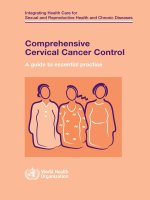American Medical Association Guide to Talking to Your Doctor pot
Bạn đang xem bản rút gọn của tài liệu. Xem và tải ngay bản đầy đủ của tài liệu tại đây (1.52 MB, 257 trang )
Guide to
Talking to Your Doctor
ffirs.qxd 8/13/01 1:31 PM Page i
Other books by the
American Medical Association
American Medical Association
Complete Guide to Men’s Health
American Medical Association
Guide to Home Caregiving
American Medical Association
Family Medical Guide
American Medical Association
Complete Guide to Women’s Health
American Medical Association
Complete Guide to Your Children’s Health
American Medical Association
Family Health Cookbook
American Medical Association
Guide to Your Family’s Symptoms
American Medical Association
Handbook of First Aid and Emergency Care
American Medical Association
Essential Guide to Menopause
American Medical Association
Essential Guide to Hypertension
ffirs.qxd 8/13/01 1:31 PM Page ii
Guide to
Talking to
Your Doctor
Angela Perry, MD
Medical Editor
J
OHN W ILEY & SONS,INC.
New York
•
Chichester
•
Weinheim
•
Brisbane
•
Singapore
•
Toronto
ffirs.qxd 8/13/01 1:31 PM Page iii
Copyright © 2001 by American Medical Association. All rights reserved
Published by John Wiley & Sons, Inc.
Design and production by Navta Associates, Inc.
No part of this publication may be reproduced, stored in a retrieval system, or
transmitted in any form or by any means, electronic, mechanical, photocopying,
recording, scanning, or otherwise, except as permitted under Section 107 or 108 of
the 1976 United States Copyright Act, without either the prior written permission
of the Publisher, or authorization through payment of the appropriate per-copy fee
to the Copyright Clearance Center, 222 Rosewood Drive, Danvers, MA 01923,
(978) 750-8400, fax (978) 750-4744. Requests to the Publisher for permission
should be addressed to the Permissions Department, John Wiley & Sons, Inc., 605
Third Avenue, New York, NY 10158-0012, (212) 850-6011, fax (212) 850-6008,
email:
This publication is designed to provide accurate and authoritative information in
regard to the subject matter covered. It is sold with the understanding that the pub-
lisher is not engaged in rendering professional services. If professional advice or other
expert assistance is required, the services of a competent professional person should
be sought.
The recommendations and information in this book are appropriate in most cases;
however, they are not a substitute for a medical diagnosis. For specific information
concerning a medical condition, the AMA suggests that you consult a physician. The
names of organizations, products, or alternative therapies appearing in this book are
given for informational purposes only. Their inclusion does not imply AMA endorse-
ment, nor does the omission of any organization, product, or alternative therapy indi-
cate AMA disapproval.
Photo credits: p. 4, © AMA; p. 12, © PhotoDisc; p. 36, © Corbis;
p. 66, © Stone/Bruce Ayres; p. 80, © PhotoDisc; p. 110, © PhotoDisc.
This title is also available in print as ISBN 0-471-41410-7.
Some content that appears in the print version of this book may not be available in
this electronic edition.
For more information about Wiley products, visit our web site at www.Wiley.com.
fcopyebk.qxd 8/13/01 1:58 PM Page iv
v
Most of us think of medicine as a high-tech science, which it is.
But for doctors, the core of their practice is their interaction
with patients. Good medicine is a partnership between doctor
and patient, whether the doctor is performing a physical exam-
ination or listening carefully to a patient’s description of his or
her symptoms. The American Medical Association Guide to Talking
to Your Doctor is designed to help nurture and strengthen this
relationship.
If you are reading this book, you have decided to take
responsibility for your health and you want to learn how to get
the information you need to help you make informed decisions
about your healthcare. You may have older or younger family
members whom you accompany to the doctor, and you want to
help them get the best care possible. Perhaps you need a spe-
cialist or have moved to another town; this book explains the
resources you can tap into to find a doctor in your new commu-
nity. One of these resources is the American Medical Associa-
tion Web site at (click on Doctor
Finder).
Foreword
ffirs.qxd 8/13/01 1:31 PM Page v
This book gives you information about how to prepare for a
doctor’s visit or phone call. Should you tell your doctor about an
alternative treatment you are using? Should you ask about a
medication you saw advertised on television? If you need to
undergo a diagnostic test, how do you find out how the test is
done and what to expect during the test? At some time in our
lives, each of us will have a health problem that we would rather
not discuss. The section in the book on talking about sensitive
subjects gives you some helpful tips on how to bring the subject
up and gives you the encouragement to do so.
We at the American Medical Association hope that this
information will help you feel more confident and comfortable
the next time you visit your doctor. We wish you and your fam-
ily good health.
American Medical Association
vi FOREWORD
ffirs.qxd 8/13/01 1:31 PM Page vi
The American Medical Association
Robert A. Musacchio Senior Vice President, Business and
Membership
Anthony J. Frankos Vice President, Business Products
AMA Press
Mary Lou S. White Editorial Director
Patricia Dragisic Senior Managing Editor
Donna Kotulak Managing Editor
Robin Fitzpatrick Husayko Senior Editor
Claudia Appeldorn Copy Editor
Mary Ann Albanese Image Coordinator
Reuben Rios Editorial Assistant
Roger Banther Editorial Assistant
Medical Editor
Angela Perry, MD
Writers
Steven Michaels
Ellen Hughes
Acknowledgments
Bruce Blehart, JD Health/Law Litigation
Arthur Elster, MD Integrated Clinical and Public
Health/Science
Linda Emanuel, MD Ethical Standards
Kathryn Meshenberg Ethical Standards
Leatha Tiggelaar Science, Technology, and Public
Health
Patricia Watson Ethical Standards
Mathew Wynia, MD, MPH
Ethical Standards
ffirs.qxd 8/13/01 1:31 PM Page vii
ffirs.qxd 8/13/01 1:31 PM Page viii
ix
INTRODUCTION 1
1. CHOOSING A DOCTOR 5
What are you looking for? 5
Other issues to consider 6
How to go about choosing a doctor 8
Your rights and responsibilities as a healthcare
consumer 9
2. WHAT YOUR DOCTOR WANTS TO KNOW
ABOUT YOU 13
Personal health history 14
Your child’s health history 23
Family health history 27
Medications 29
Self-treatment 31
Lifestyle 33
3. TALKING ABOUT YOUR HEALTH
AND MEDICAL CARE 37
Planning in advance what to say to the doctor 37
Making the most of an office visit 40
Contents
ffirs.qxd 8/13/01 1:31 PM Page ix
Learning about medical tests and treatments 42
Surgery 45
Understanding a diagnosis 49
Using medications correctly 50
Making lifestyle changes 55
Clearing up misunderstandings 64
4. TALKING FOR OTHERS 67
Accompanying your child to the doctor 67
Accompanying your older parent to the doctor 75
5. TALKING ABOUT SENSITIVE SUBJECTS 81
Sexually transmitted diseases 83
Homosexuality and bisexuality 86
Sexual problems 87
Alcohol dependence 89
Drug addiction 91
Family violence 91
Depression 92
Incontinence 95
Self-treatments 98
Dissatisfaction with treatment 100
End-of-life healthcare issues 103
6. SPECIAL SITUATIONS 111
Specialists and subspecialists 112
Getting a second opinion 115
At the hospital 117
In an emergency 124
Rare diseases 128
Participating in clinical trials 131
Doing your own research 137
x CONTENTS
ffirs.qxd 8/13/01 1:31 PM Page x
RESOURCES 141
Advocacy 141
Clinical trials 148
Diseases and conditions 150
General health information 171
Government agencies 175
Health information Web sites 181
Home-care services and hospice 186
Long-term care and housing 189
Mental health 191
Rehabilitation 195
Self-help and support 197
Miscellaneous 201
GLOSSARY 205
INDEX 235
CONTENTS xi
ffirs.qxd 8/13/01 1:31 PM Page xi
ffirs.qxd 8/13/01 1:31 PM Page xii
1
Today the emphasis in health and medical care is on preven-
tion. The American Medical Association Guide to Talking to Your
Doctor focuses on the importance of an effective patient-doctor
relationship in improving and maintaining your health and
reducing your health risks. Use this book as a tool to become an
informed, active healthcare participant and to take control of
your health and medical care.
In many patient-doctor relationships, the doctor is the more
active participant. The doctor talks and the patient listens, the
doctor asks questions and the patient provides answers. This
limited communication can cause problems for both doctor and
patient and can have a negative impact on the patient’s health
and medical care. For example, if you don’t understand the
information your doctor provides, you may become confused
and frustrated and lose confidence in the doctor. You may even
stop following his or her instructions, and, as a result, your
treatment may not be effective and your health problems could
get worse.
Many people are hesitant to talk to their doctor even though
they want to ask questions or discuss their health problems.
Introduction
cintro.qxd 7/25/01 10:52 AM Page 1
Embarrassment and fear of bad news are two common reasons
for not talking to the doctor. Other possible explanations
include both real and imagined time limitations, reluctance to
question the doctor’s authority, limited ability to speak English,
feeling that one’s questions and concerns are unimportant, and
not wanting to appear stupid. But to get all you need from your
medical care and make informed health-related choices, you
need to assume an active role in your own health and medical
care. Your doctor relies on information only you can provide,
such as details about symptoms, before he or she can make an
accurate diagnosis or provide proper treatment. He or she also
must have confidence in your ability to follow instructions care-
fully so that your treatment can be effective.
Your doctor should encourage and support your active par-
ticipation and always should be willing to take time to address
your questions and concerns. The highest levels of satisfaction
with medical care and the best treatment outcomes occur when
both doctor and patient communicate openly and honestly and
work together closely to achieve shared goals.
To become an active partner you need to listen carefully, ask
questions, discuss treatment options and goals, participate in
decision-making, follow instructions carefully, know what to
expect from your treatment, and provide feedback. All of this
requires clear communication between you and your doctor.
Although it may be difficult at first, you will discover that you
and your doctor will gradually work together more easily as you
get to know each other. Both you and your doctor will benefit.
The book is divided into six chapters. “Choosing a Doctor”
helps you find what you are looking for in a physician and tells
you how to go about the search. Use the checklists and record-
keeping forms in the second chapter, “What Your Doctor
Wants to Know about You,” to keep your and family members’
health histories. “Talking about Your Health and Medical
2
I
NTRODUCTION
cintro.qxd 7/25/01 10:52 AM Page 2
Care,” “Talking for Others,” and “Talking about Sensitive Sub-
jects” give you guidelines for discussing your health risks and
healthcare needs with your doctor. These chapters also prepare
you for talking to doctors for members of your family, such as a
child or an older parent, and encourage you to overcome any
embarrassment or hesitation you may have about talking openly
and honestly with your doctor about sensitive subjects such as
sex. The “Special Situations” chapter helps you evaluate the
benefits and risks of treatment options such as surgery that you
may be faced with and enables you to make an informed deci-
sion about an appropriate treatment for you.
At the end of the book, the resources section and the glossary
help you find information about specific topics and understand
terms you may have heard or read or that your doctor may use
in your visits. The resources section gives the names, addresses
(including some e-mail addresses), phone numbers (usually toll-
free), and Web sites of diverse associations and organizations
that provide information on health or healthcare-related topics.
The resources section is subdivided into segments such as advo-
cacy, clinical trials, diseases and conditions, health information
Web sites, home-care services and hospice, long-term care and
housing, mental health, rehabilitation, and self-help and sup-
port.
INTRODUCTION 3
cintro.qxd 7/25/01 10:52 AM Page 3
An Active Partnership
Your relationship with your doctor is a working partnership with a common goal: to keep you
healthy. When choosing a doctor, look for someone who takes the time to listen to your concerns and
who answers your questions clearly and in a reassuring tone. You want to have confidence in the
doctor and feel comfortable enough with him or her to be able to express your concerns openly. The
more open and honest you are with your doctor, the better able he or she will be to evaluate your
health risks, diagnose an illness, and provide effective treatment.
c01.qxd 7/25/01 10:52 AM Page 4
5
There are many reasons why you might need to choose a doc-
tor. A change in health insurance, a move to another city, the
need for a specialist, your doctor’s retirement, or a communica-
tion problem with your present physician all could be factors. If
you or a family member recently had a baby, you need a pedia-
trician or a family practitioner to care for the child. Take your
time and ask questions while you are in the process of choosing
the physician who is right for you. Don’t make this important
decision in a rush. And don’t wait until you are really sick or you
have a medical emergency to explore your options.
What Are You Looking For?
Whether you are looking for a primary care physician or a spe-
cialist, consider your own preferences and needs. You can easily
1
Choosing a Doctor
c01.qxd 7/25/01 10:52 AM Page 5
find a great deal of information about a doctor—from board
certification (see page 49) and education to practice philosophy
and number of years in practice. What is important to you? Per-
haps you prefer a physician who is older than you are, or of the
same sex. Would you like your doctor’s cultural background to
be similar to yours? Are you more drawn to a person who is
warm and personally connected to you, or are you more inter-
ested in a doctor’s technical knowledge? If a doctor’s technical
knowledge is more important to you, look for a doctor who has
a teaching position at a university or has clinical privileges at a
respected hospital.
Choosing a Doctor
Q I’m interested in finding a new doctor in my community.
What kind of information on physicians can I get using one of
those telephone or online doctor-finder services?
A Most doctor-selection services organize physicians by
medical practice and location. Some provide information about
their background, interests, education, and training. Expanded
listings may include photographs of the physicians and their
professional achievements. Patients can have a number of dif-
ferent reasons for choosing a physician. For example, some may
prefer a doctor who speaks their native language. Or they may
feel more comfortable with a physician of the same sex or about
the same age.
Other Issues to Consider
Besides personal preference and philosophy, you also will have
to consider issues of time, location, and cost. A doctor’s office
6 AMERICAN MEDICAL ASSOCIATION GUIDE TO TALKING TO YOUR DOCTOR
c01.qxd 7/25/01 10:52 AM Page 6
hours or location may enter into your decision. Find out if you
will have to make an appointment far in advance and if his or
her office hours and days are convenient for you. Who can see
you when your doctor is away or otherwise unavailable? How
far will you have to travel to an appointment?
If you are in a managed care plan, your choices are narrowed
because you need to choose your doctor from a list of those in
the plan. Or you may need a doctor who will accept Medicare.
If you do not have health coverage through work, or if you have
an individual health plan with limited benefits or no insurance
at all, you will have to consider cost along with all the other
factors.
Under many health insurance plans, changing doctors means
selecting another from the list of physicians whose services are
included in your plan’s coverage. Before you make a choice, ask
around. Other people in the same plan may be able to recom-
mend a physician whose approach would be good for you.
Should You Change Doctors?
Q I have been seeing the same doctor for 10 years and sud-
denly I am having a hard time making an appointment. When I
do get an appointment, I have to wait at least an hour before
seeing her. I don’t know what to do because I have always had
confidence in this doctor and I respect her medical knowledge.
Should I complain to her or someone in her office or should I
just get another doctor?
A Because you like and respect your doctor, you should see
if
there is a way to solve the problem before you look for another
doctor. It’s important that you have confidence in your doctor. In
a calm, courteous way, let the doctor know about the difficulty
you’ve been having getting in to see her. She is prob
ably
CHOOSING A DOCTOR 7
c01.qxd 7/25/01 10:52 AM Page 7
unaware of the problem and will be happy to have your input. If
the problem persists or gets worse and you feel no effort has
been made to improve it, then you might consider finding
another doctor.
How to Go about Choosing a Doctor
You can choose a doctor in a number of ways. Ask friends and
relatives about their doctors and if they have had good experi-
ences. Ask specifically why they like their doctor; you might not
have the same preferences. You also can ask medical specialists
and other healthcare professionals for recommendations. Check
with a nearby hospital or medical school. An old standby is to
ask a doctor the name of his or her doctor; this usually works
well when you need a specialist (“Who checks your eyes?” for
example). Local medical societies can give you the names of
doctors who are accepting new patients in your area. And many
hospitals offer physician-referral services at no charge.
T
he newest way to find a doctor is through an online doctor-
referral service (see “General Health Information” Web sites
starting on page 171). These services will be able to provide you
with most, if not all, of the above-mentioned criteria. Whether
you need to stick to a list of physicians or are free to choose for
yourself, you can find out more about any physician by searching
Doctor Finder on the American Medical Association’s Web site.
Access it from the AMA’s home page at
(s
ee page 173). Here you can locate doctors in your area by
specialty and find out specifics about their medical training,
specialty certification, and practice. After you have made your
decision, have a copy of your medical records sent to your new
doctor.
8 AMERICAN MEDICAL ASSOCIATION GUIDE TO TALKING TO YOUR DOCTOR
c01.qxd 7/25/01 10:52 AM Page 8
Your Rights and Responsibilities
as a Healthcare Consumer
People who communicate openly and effectively with their
physician and other healthcare professionals and who also know
their rights as healthcare consumers are better equipped to
make informed decisions about their health and healthcare. You
have the following rights as a healthcare consumer:
●
To receive considerate and respectful care without regard
to your sex, age, race, ethnic background, religion, or
income.
● To be fully informed, in terms you can understand, about
your disease or condition, potential treatment options, and
possible outcomes.
● To know the names and roles of the people who are provid-
ing your treatment (such as doctors, nurses, therapists, and
other healthcare professionals).
● To participate in decisions about your healthcare and to con-
sent to or refuse a given course of treatment. If you refuse
treatment, you are entitled to consider other available, real-
istic, and medically appropriate treatment options.
● To seek second opinions.
● To change doctors if you are not satisfied with the care you
are receiving.
● To put in place advance directives such as a living will or
durable power of attorney for healthcare to help ensure that
your healthcare preferences are honored if you are not able
to speak for yourself.
● To have your privacy respected regarding all aspects of your
health and healthcare.
CHOOSING A DOCTOR 9
c01.qxd 7/25/01 10:52 AM Page 9
● To have your medical records kept confidential, except in
cases where reporting is allowed or required by law (such as
for review by insurers or for public health concerns). Confi-
dentiality is emphasized in these circumstances. Your written
permission is required to release your medical records to
other interested parties.
● To review your medical records and have the information
explained and interpreted for you, unless restricted by law in
your state.
● To receive reasonable responses to reasonable requests for
service.
● To receive reasonable continuity of care.
● To be able to refuse to participate in research studies. A per-
son considering whether to participate in research studies is
entitled to be fully informed about such studies before giving
consent.
● To receive and review a bill for services provided, and to have
that bill explained to you.
You also have responsibilities as a healthcare consumer. By
becoming actively involved in your healthcare, you will be
able to make informed choices that will help you to improve
and maintain your health for the rest of your life. To be a
responsible, informed healthcare consumer, you should do the
following:
● Provide complete and accurate information to healthcare
professionals about your health history, including past ill-
nesses, hospitalizations, and use of medication.
● Become involved in healthcare decisions.
10 AMERICAN MEDICAL ASSOCIATION GUIDE TO TALKING TO YOUR DOCTOR
c01.qxd 7/25/01 10:52 AM Page 10
● Ask questions whenever you do not understand any informa-
tion or instructions from your doctor or other healthcare
professional.
● Communicate openly and honestly with your doctor about
your health and healthcare.
● Work closely with your doctor.
● Follow your doctor’s instructions completely and carefully.
● Tell your doctor if you have problems with your treatment.
● Acknowledge the effect that your lifestyle can have on your
health and take responsibility for improving your lifestyle.
● Become familiar with the benefits provided by your health-
care plan.
CHOOSING A DOCTOR 11
c01.qxd 7/25/01 10:52 AM Page 11
Providing Information
To help your doctor make an accurate diagnosis of a medical condition or recommend effective
treatment, you need to give him or her accurate information, including details about any medications
you are taking. It’s a good idea to bring all your medications in their containers with you to the
doctor’s office so he or she can evaluate them. Information about your medications is especially
helpful if your doctor is considering prescribing another medication for you.
c02.qxd 7/25/01 10:55 AM Page 12









